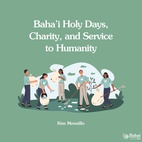The views expressed in our content reflect individual perspectives and do not represent the official views of the Baha'i Faith.
From the moment we’re born, the way our parents treat us affects us for our whole life. Our attachment style in adult relationships is shaped by whether our parents consistently met our needs or not as a child.
Three human attachment types exist: secure, anxious-ambivalent, and anxious-avoidant. If our parents consistently attended to our needs, we will more than likely have a “secure attachment.”
What are our needs as children? We immediately think of love and caring, which are shown in innumerable ways both intrinsically and extrinsically. According to experts, some intrinsic ways parents show this are by praising our children for effort rather than success or ability, pointing out progress made, encouraging autonomy by making choices and encouraging problem solving, having realistic expectations, recognizing the good things our children do, and praising them on that rather than pointing out shortcomings.
Abdu’l-Baha points out:
Let the mothers consider that whatever concerneth the education of children is of the first importance. Let them put forth every effort in this regard, for when the bough is green and tender it will grow in whatever way ye train it. Therefore is it incumbent upon the mothers to rear their little ones even as a gardener tendeth his young plants. Let them strive by day and by night to establish within their children faith and certitude, the fear of God, the love of the Beloved of the worlds, and all good qualities and traits. – Selections from the Writings of Abdu’l-Baha.
Doing these things creates intrinsic positive motivation in children. As a result, they are more likely to exhibit similar traits with others and with their own children later. In my own experience with my children, this built trust, respect, acceptance, and love in them.
Extrinsically, parents show they care by providing a safe and secure home environment as well as necessities like food, clothing, and schooling. This can be difficult — or extremely difficult — for parents without the livelihoods or means, or without a stable government or society in which to live. Today too many parents who wish to care for their children are stymied by trying circumstances, situations we are all called upon to alleviate however we can. Laws granting immigrant asylum, job training, parental paid leave, healthcare coverage, daycare, and education must all become rights every citizen is entitled too.
All humans are motivated by one of two realities, or outcomes, for their actions: reward or punishment. Children, particularly, find it difficult to know the difference between the two because they must learn the consequences of their behavior from schooling, socialization, parents, and their own experience. Often negative behavior leads to attention, which many of us crave from a young age. A good teacher knows that negative behavior, in order to be extinguished, must be either ignored or corrected, but corrected in a positive manner.
Abdu’l-Baha wrote that under no circumstances should a child be struck or vilified, for their character would become totally perverted.
Whensoever a mother seeth that her child hath done well, let her praise and applaud him and cheer his heart; and if the slightest undesirable trait should manifest itself, let her counsel the child and punish him, and use means based on reason, even a slight verbal chastisement should this be necessary. It is not, however, permissible to strike a child, or vilify him, for the child’s character will be totally perverted if he be subjected to blows or verbal abuse. – Ibid.
Unfortunately, case after case exists of parents abusing their children. Memoirs abound with such stories and we are sometimes floored that those children were able to rise above those circumstances and become happy, secure, and productive members of society. The upshot is that the family unit must be protected and supported by society. It is the foundation-stone of every culture and society. If it is treated as such benefits accrue to the community, state, nation, even to the world.
The integrity of the family bond must be constantly considered, and the rights of the individual members must not be transgressed. The rights of the son, the father, the mother — none of them must be transgressed, none of them must be arbitrary. Just as the son has certain obligations to his father, the father, likewise, has certain obligations to his son. The mother, the sister and other members of the household have their certain prerogatives. All these rights and prerogatives must be conserved.… – Abdu’l-Baha, The Promulgation of Universal Peace.
Here is a simple creed to follow: Within the family setting, the rights of all members must be respected.

















Comments
Sign in or create an account
Continue with Facebookor